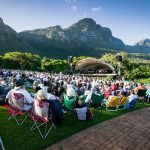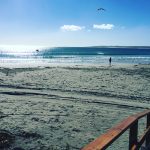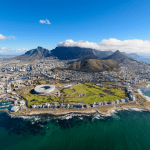 The first images that usually come to mind when one thinks about Camps Bay are beaches, luxury and trendy cocktail bars.
The first images that usually come to mind when one thinks about Camps Bay are beaches, luxury and trendy cocktail bars.
This is where locals and visitors alike flock to enjoy spectacular sunsets over the Atlantic Ocean, the Twelve Apostles mountain range in the background, white sandy beaches flanked by palm trees and some of the finest villas and residential properties in the city.
While these factors are without a doubt an integral part of the area, Camps Bay offers so much more than meets the eye.
From Hunting Grounds to Leisure Destination
Centuries ago, Camps Bay’s original inhabitants were the San and Khoi people. The Twelve Apostles was covered in rich forests, with lion, leopard and many species of antelope to be found within the lush vegetation surrounding the area. These tribes lived on the slopes of the mountain, until a deadly outbreak of measles and smallpox caused the remaining tribes to move to the Oudekraal area.
During the Dutch colonisation, the area was later granted to John Lodewyk Wernich, who married Anna Koekemoer. After the death of Wernich in 1778, his widow inherited the area. She later married Frederik Ernst von Kamptz (a sailor allegedly after her inheritance), who named the area ‘Die Baai van von Kamptz’. This name would later be translated into English to become the Camps Bay that is known today.
 During the 19th Century, Camps Bay was used as a hunting ground by the Governor of the Cape, Lord Somerset. Popular restaurant and tea room The Roundhouse was used as a hunting lodge for the Governor, who took advantage of the rich wildlife that was found in the forests surrounding the area. Eventually in 1848, Kloof Nek Road was built, followed by Victoria Road in 1888, which was named in honour of Queen Victoria.
During the 19th Century, Camps Bay was used as a hunting ground by the Governor of the Cape, Lord Somerset. Popular restaurant and tea room The Roundhouse was used as a hunting lodge for the Governor, who took advantage of the rich wildlife that was found in the forests surrounding the area. Eventually in 1848, Kloof Nek Road was built, followed by Victoria Road in 1888, which was named in honour of Queen Victoria.
Over the next few decades, Camps Bay became popular as a picnic site, with landmarks such as the tidal pool and the Rotunda built as the area developed. The suburb was officially incorporated into Cape Town in 1913.
Venturing Off the Beaten Path in Camps Bay
While you won’t find any wildlife left in Camps Bay, there are still plenty of other highlights along with the beaches and buzz of Victoria Road. Here are some ideas for some interesting things to do in Camps Bay:
- Scuba diving – Oudekraal is an excellent spot for scuba divers, with shipwrecks, kelp forests and other things to explore underwater.
- Culture – the Theatre on the Bay houses a number of shows and productions throughout the year.
- Paragliding – anyone who’s ever watched the paragliders sail down over the mountain should try this experience at least once!
- Karaoke – Dizzy’s is the best place for good pizza and highly entertaining karaoke nights.
- Hiking – the Camps Bay Pipe Track walk starts at Kloof Nek, and continues up to the old water pipe at the top of Camps Bay.
- Movie nights – get a group of friends, and head to the Leopard Lounge for a night of movies, cocktails and fun.
- Picnic – pack a picnic (no booze sadly) and visit Glen Beach for a more peaceful, sheltered beach that has a great swimming area.
- Breakfast – get a taste of history, great service and good food at The Roundhouse – the former hunting lodge of Lord Somerset.
Whether you are new to Cape Town, or you simply want to rediscover the many attractions of the city, Camps Bay attractions showcase many different sides to one of the city’s most popular areas. As summer comes to an end, and the beaches begin to empty, there are still many things to do in the area, whatever your taste for adventure might be.
Share your thoughts on favourite things do to in the Camps Bay area on our Facebook page!





